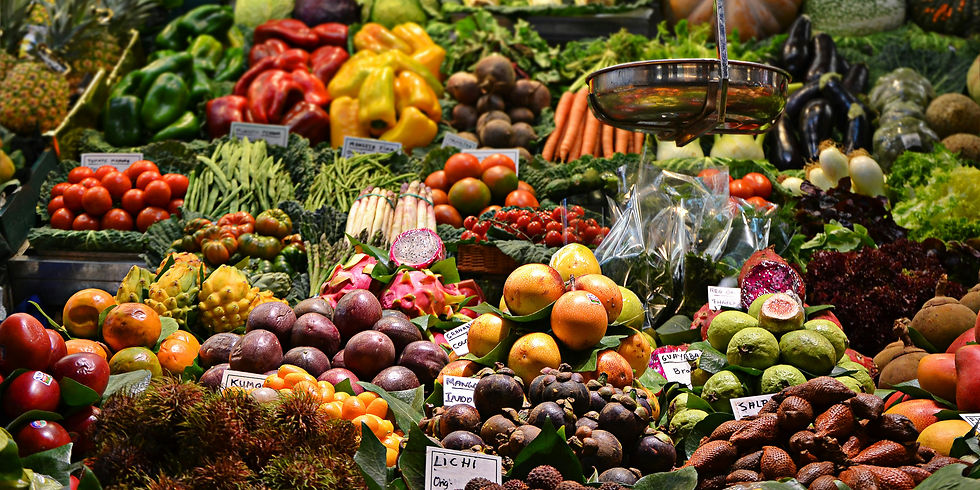The emerging bowel challenge for young Australians: Why diet matters now more than ever
- Benjamin David

- Aug 29, 2025
- 3 min read

By Benjamin David, Accredited Practising Dietitian APD
Bowel Cancer is the fourth most common type of cancer in Australia and is a public health concern that we all need to pay attention to.
Over the last 20 years, bowel cancer amongst younger Australians aged under 50 has been rising at an alarming rate.
It is estimated that the rate of bowel cancer in 15–24-year-olds has surged by over 266% over recent decades. Even more concerning, over 80% of younger patients are being diagnosed at later cancer stages, when treatment is more complex.
Why Are Younger People at Risk?
Whilst specific mechanisms are not well understood yet, research attribute several lifestyle factors that may be driving this trend:
Ultra-processed foods
Modern diets high in processed foods and red meat, fat, refined grains, high-sugar beverages, along with not enough fibre play a big role.
Lifestyle
Alcohol, tobacco, being above healthy weight range and being less active all increase risk.
Gut Microbiome
These risk factors increase bowel cancer risk by disrupting the gut microbiome, the community of bacteria living in our intestines. When the balance shifts, harmful bacteria can overgrow while protective ones decline. This imbalance can trigger ongoing inflammation and the release of harmful substances, which may damage our gut and increase cancer risk.
What can you do to lower your risk
Many of the risk factors are within our control. Small daily choices can have a big impact:
Eat more fibre
Fibre feeds healthy gut bacteria and helps keep the bowel moving. Aim for plenty of fruits, vegetables, legumes such as beans and lentils, nuts, seeds and wholegrains.
Cut back on processed foods and red meats
Bacon, sausages, salami and large amounts of beef or lamb are linked to higher bowel cancer risk. Try swapping some meat meals for fish, chicken or plant-based proteins like lentils, tofu or chickpeas.
Include calcium-rich foods
Dairy foods like milk, yoghurt, and cheese (or fortified alternatives) play a protective role in bowel cancer. Calcium binds to bile acids and fatty acids that irritate the bowel lining and contribute to cancer risk. By neutralising these, calcium helps protect the cells in the colon from damage.
Ensure a Folate-rich diet
Folate plays a crucial role in DNA repair and cellular health. A folate-rich diet supports healthy cell turnover and prevents abnormal growth. Food sources of folate include leafy greens such as spinach, legumes and fortified cereals and grains.
Magnesium
Magnesium helps regulate digestion, supports enzyme function and plays a role in reducing inflammation. Foods rich in magnesium include nuts and seeds, whole grains and leafy green vegetables.
Limit alcohol and avoid smoking
Both increase risk. The less, the better.
Get active
Regular physical activity supports healthy digestion and lowers cancer risk. Even a daily walk helps.
Small Steps, Big Impact
You’re never too young to look after your bowel health. By eating more fibre, cutting back on processed foods and moving regularly, you’re taking powerful steps to reduce your risk.
Ready to Take Charge of Your Gut Health?
A Dietitian can help you:
Create a personalised meal plan tailored to your lifestyle.
Review your overall nutrient intake (such as Fibre, calcium, folate and magnesium)
Find easy food swaps to reduce cancer risk while still enjoying your meals.
Build long-term habits that support a healthy gut microbiome.
Speaking with a dietitian can help you make small changes that fit into your lifestyle and have a big impact on your long-term health.
Book a Dietitian appointment today and start taking care of your gut health now.
Benjamin David, APD
Ben is an Accredited Practising Dietitian (APD) with extensive experience working in community health and clinical settings across metropolitan Melbourne. He specialises in weight management, nutritional management of diabetes and nutrition for older adults. He recognises the unique needs and challenges that each individual faces and works together with them to achieve their goals and improve their quality of life.

Comments